It’s a surprise guest who arrives in Casablanca on November 21. Proof of his importance, the economic metropolis is abuzz with activity just hours before his surprise arrival. In keeping with Moroccan tradition, the security services are pulling out all the stops to ensure that the Moroccan visit of one of the world’s most powerful people takes place under the best possible conditions.
Morocco wants to become a strategic partner for China. For Beijing, the Kingdom is a gateway to the American and European markets. For its part, Rabat wants to benefit from Chinese investment and know-how. And, why not, gain Beijing’s support… pic.twitter.com/z6QocGsrAH
– TelQuel (@TelQuelOfficiel) December 10, 2024
To the dismay of inhabitants of Casablanca, some of the city’s main roads, notably those leading to Anfa Supérieur, are blocked by the authorities. Vehicles are speeding across them, obviously heading for Mohammed V airport. A few hours later, the inhabitants of the white city were to understand the reasons for this upheaval, when a dispatch from the MAP news agency announced the arrival of Chinese President Xi Jinping in Morocco.
On his return from Brazil, where he took part in the G20 summit, the Chinese head of state had come to make a « technical stopover » in the kingdom’s economic capital. Proof of the unexpected nature of this visit, no Chinese flag was raised in Casablanca. But the surprises didn’t stop there.
When he stepped onto the tarmac at Mohammed V airport, Xi Jinping was greeted not by King Mohammed VI, but by Crown Prince Moulay El Hassan, officially undertaking his first diplomatic activity. A real first, thanks to the « high instructions » given to him by the sovereign. Xi Jinping was accorded all the honors due to his rank. The red carpet was rolled out as the Chinese president stepped off his Boeing 747, and after being welcomed by the Crown Prince, he reviewed the Royal Guard.
Moulay El Hassan and Xi Jinping then headed for the airport’s VIP lounge, which was the setting for a scene that made the rounds on social networks. As tradition dictates, the Chinese president is invited to the date and milk offering ceremony. But when it came time to put his hand in the dish, the president seemed hesitant. He grabs the fruit and pretends to eat it. Then he seems to change his mind and tries to put the date back on his tray.
That’s when Moulay El Hassan steps in, grabbing a date himself. The gesture gave the President confidence, and the two men ate the fruit at the same time, before embarking on a discussion centered on the development of the strategic partnership between the two countries in the airport’s VIP lounge.
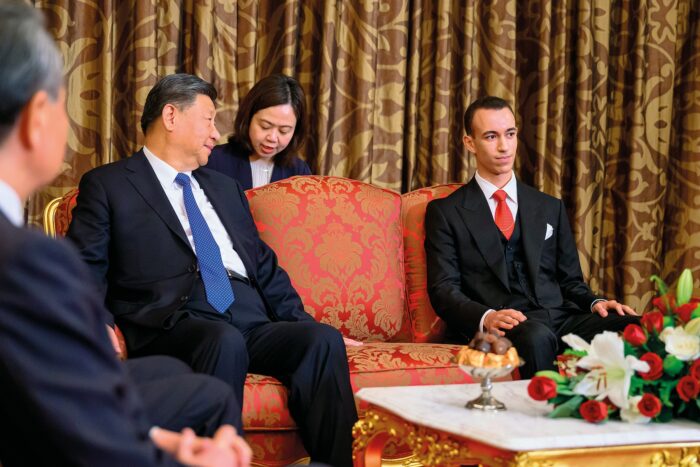
The scene is symbolic in more ways than one. Not only does it mark the Crown Prince’s first official diplomatic outing, it also perfectly represents the relationship between Morocco and China. Two countries that still seem hesitant when it comes to approaching each other, but reach a consensus once discussions have begun. Two countries so far apart, yet so close.
A royal anchor
China and Morocco have much in common. « They are both countries with millennia-old cultures deeply rooted in their societies. Morocco and China are countries where power and reform take place over a long period of time« , points out this businessman accustomed to traveling between Morocco and China.
« Both our countries are in favor of respecting national sovereignty and territorial integrity. These are ideas we defend in international organizations and regional forums », points out Li Changlin, Chinese ambassador to Morocco
But beyond cultural, historical and societal considerations, the two countries share common values that are reflected in the deployment of their international policies. « Our two countries are in favor of respecting national sovereignty and territorial integrity. These are ideas that we defend within international organizations and regional forums« , points out Li Changlin, China’s ambassador to Morocco, in an interview with TelQuel.
On the international stage, the kingdom has notably declared its adherence to the one-China principle, which means that Rabat does not recognize Taiwan (which Beijing considers to be Chinese territory). This common ground was then reinforced by the establishment of a common horizon thanks to Mohammed VI’s visit to Beijing in May 2016.
During this royal visit to China, 15 agreements were signed between the two countries. They all concern innovative projects, some of which are just beginning to bear fruit, such as the Cité Mohammed VI Tanger Tech or the creation of a water highway.
In the wake of this visit, Morocco decided to exempt Chinese citizens from visa requirements in order to encourage Chinese tourism to the kingdom. Since then, little or nothing has happened on the political front. Contacts between officials continue without any new impetus from the top of the State.
It was not until Covid-19 that the relationship between the two countries was revived. During the health crisis, the Middle Kingdom was one of Morocco’s main supporters, supplying it with Sinopharm vaccines manufactured in China.
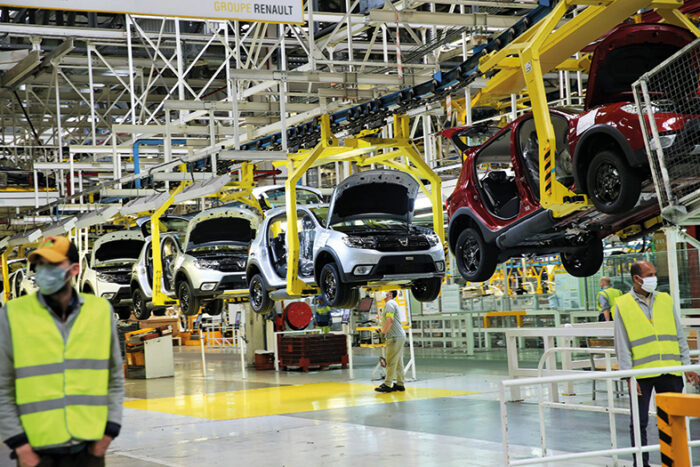
Demonstrating Morocco’s commitment to China, Rabat appointed a new ambassador to Beijing in 2023, Abdelkader El Ansari. Head of the Asia Division, he is one of the heavyweights of Moroccan diplomacy. He is also the man who went to Beijing to negotiate the Sinopharm vaccines deal.
A hassle named Algiers
The fundamentals may be good, but the development of the political relationship between the two countries is fraught with obstacles. On the Sahara issue, for example, Beijing is clearly not one of Morocco’s outspoken supporters. This fact was highlighted on October 31 at the United Nations Security Council, when Algeria attempted to torpedo the resolution concerning the Minurso (United Nations Mission in the Sahara).
On that day, Algiers presented an amendment aimed at adding a human rights observation mission to the UN mission’s mandate. The Algerian proposal won the support of Mozambique, a traditional supporter of the Polisario, but also, and more surprisingly, that of China. Beijing then tried to « make it up » to Morocco by voting in favor of a resolution highlighting Morocco’s contribution to resolving the issue. But the damage had already been done. China’s support is causing some Moroccan diplomats to chatter.
[To have an amendment devoted to human rights sponsored by both China and Algeria is the height of irony », says a Moroccan diplomat[/blockquote]
« To have a human rights amendment sponsored by both China and Algeria is the height of irony, » says one Moroccan diplomat. For our interlocutor, the Chinese gesture has more to do with the history of the country – which was part of the Communist bloc alongside Algeria – than with any real intention to harm Morocco. » It’s a pointless vote that’s more a gesture of sympathy for a country in a delicate situation than of any real conviction« , continues this official at the Ministry of Foreign Affairs.
The Chinese side seems to plead ignorance. “Very few Chinese have a good grasp of the Sahara issue,” said Li Changlin, China’s ambassador to Morocco, in an interview given to TelQuel a few days before the Algerian amendment was tabled. The diplomat also insists on the fact that China has voted in favor of UN resolutions on the Sahara in recent years.
For Beijing, the official position on the Sahara issue resembles almost word for word what is advocated by many countries: Beijing is in favor of a lasting solution mutually accepted by both parties. For China, therefore, there is no question of realism or outright support for the autonomy plan put forward by Morocco. At least for the time being.
Morocco, not really a priority
For China, which has its eye on Taiwan and is trying to extend its influence in the Asia-Pacific region, Morocco and the Moroccan identity of the Sahara are far from a priority. « For the majority of Chinese people, Morocco is still a little-known country, » says Li Changling when discussing China’s perception of the kingdom.
Unlike France, the United States or Spain, Rabat has no geopolitical, economic or migratory levers at its disposal that would allow a rapprochement of views on the Sahara issue. There is therefore no question of Morocco entering into a diplomatic tug-of-war with a country for which the Moroccan identity of the southern provinces remains a marginal issue. » On the international scene, countries such as China and Russia often act in reaction to an American position on a given issue », says our Moroccan specialist on the subject.
In short, if Washington is a clear and open supporter of Morocco on the Sahara issue, Beijing will do everything in its power to nuance the American position or use it to win its case on another issue.
« Faced with powers like the United States and China, Morocco remains a small country on the international stage. It is therefore almost normal for the Sahara issue to take a back seat to other more burning issues », adds our interlocutor.
But Beijing also seems to understand that Morocco has decided to play the multi-alignment card. » 10 years ago, Morocco looked to the United States and Europe, » says Li Changlin, as if to suggest that this is no longer the case. It has to be said that, at the political level, it will be difficult to move the lines.
Business as an all-rounder
So there’s one way out: business. Targeted by over-taxation of their electric vehicles on the American and European markets, Chinese manufacturers (and indirectly the State) have decided to retaliate by setting up factories in new countries. One of these is Morocco, where Chinese companies can take advantage of the free-trade agreements signed by Morocco with the United States and the European Union.
Beyond the electric battery sector, Beijing intends to become a partner in the Kingdom’s development. One gesture illustrates this desire: China has decided to translate Morocco’s New Development Model in its entirety. The aim? To align itself with the kingdom’s priorities.
But that’s not all: « We believe that one of the ways to strengthen relations with Morocco is to collaborate with China in sectors that are strategic for the kingdom. There’s the automotive industry, of course, but we can also offer our support and expertise in the field of renewable energies, notably hydrogen production (…)
China can make a contribution to projects that can put Morocco on the world map. It can also contribute its know-how and technical expertise in all these key strategic sectors », promises Li Changling, who also mentions potential collaboration in the field of water management.
« But above all, we need to get to know each other better », concludes the Chinese diplomat. By meeting Moulay El Hassan on October 21, the Chinese president may already have honored his part of the deal, while at the same time making China part of Morocco’s long-term diplomacy.
Xi Jinping’s inner circle
Cai Qi, the lifelong confidant
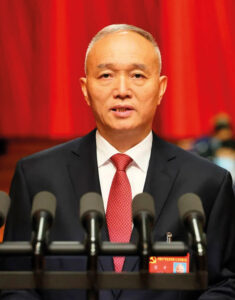
Officially, he is the Chinese regime’s Number 5. Unofficially, he is number 2, and his influence is said to be greater than that of China’s current Premier, Li Qiang. The two men are said to be rivals on the Chinese political scene.
A close friend of President Xi Jinping – he is often described as his confidant – Cai Qi worked alongside him for two decades when the Chinese head of state presided over the provinces of Fujian and Zhejiang (in south-eastern China).
A member of the Politburo of the Chinese Communist Party, he is also Xi Jinping’s chief of staff, who has gradually elevated him within the party ranks. He is sometimes sent as Beijing’s official representative on official trips abroad.
Wang Yi, the voice of reason
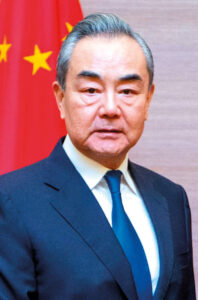
He is the face of Chinese diplomacy under Xi Jinping. As well as being head of diplomacy for almost 12 years (he was replaced during a brief seven-month interlude),
Wang Yi is also the director of the Chinese Communist Party’s Central Office of Foreign Affairs, the party body responsible for defining the direction of Chinese diplomacy.
In short, Wang Yi is the number 1 and number 2 diplomat in the Middle Kingdom. He is also the man behind the multiplication of Chinese initiatives in Africa through his constant visits to the continent.
When Beijing hardens its tone on the international stage, notably through Xi Jinping, he is usually the voice that nuances the message. [/frame]
[frame template= »normal »]
Fathallah Oualalou, a historical parallelism
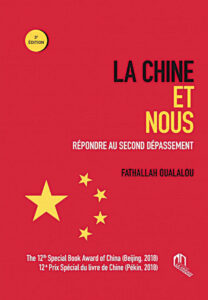
Fathallah Oualalou, former Minister of Finance, was one of the first political figures to call for the consolidation of diplomatic and economic relations between Morocco and China. Relations which, according to Oualalou, are facilitated by the parallels that exist between two former empires.
« Both are thousand-year-old states that have been colonized by a number of imperialists and share an essential, even existential point in common: the importance they attach to the principle of territorial integrity« , he recalled in an interview with TelQuel.
Beijing’s interest in the kingdom can be explained, according to Oualalou, by the bridging role it plays between Europe, America and Africa, at a time when we are witnessing what he describes as a return to bipolarization at the geopolitical level[/frame]
Written by Yassine Majdi. Edited in English by S.E.




